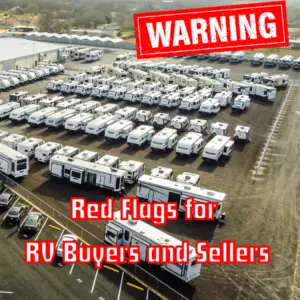
With the freedom of the open road and the excitement of discovering new places, the world of recreational vehicles (RVs) is an exciting one. But just like any other market, frauds may occur in the RV sector. To guarantee a safe and secure transaction, it’s important for both buyers and sellers to be aware of possible dangers. To assist you navigate with confidence, we’ll look at red flags in this post for both buyers and sellers in the RV sector.
For Buyers
Unrealistically Low Prices
Using absurdly cheap pricing to entice customers is one of the most popular strategies fraudsters do. A bargain is probably too good to be true if it appears too excellent. Look into any notable differences in the RV model’s market worth that piques your curiosity.
Pressure to Act Quickly
In order to force consumers to make snap judgments, scammers often instill a feeling of urgency. Sellers that demand quick action without allowing you enough time to do due diligence should be avoided. Sincere salespeople are aware of the value of making well-considered decisions.
Incomplete or Vague Vehicle History
When buying an RV, a clear and thorough vehicle history is crucial. Watch out for vendors that won’t provide you all the details on the RV’s history, such as maintenance logs and accident histories. Sincere vendors need to be forthright regarding the state of the car.
Requests for Unusual Payment Methods
Frequently, scammers demand money via unusual means like gift cards or wire transfers. To guard against fraudulent purchases, use traceable and secure payment options like PayPal or escrow services.
Unverified Contact Information
Before completing any purchase, be sure you have the seller’s contact information. Fraudsters could provide fictitious phone numbers or addresses. A trustworthy vendor will be happy to provide contact information that can be verified.
For Sellers
Overly Eager Buyers
If a customer seems very anxious to acquire anything without consulting you or haggling, proceed with caution. In order to take advantage of your need for a speedy sale, scammers could expedite the procedure.
Requests for Personal Information
Extensive personal information above what is required for the transaction is not required of legitimate purchasers. Don’t provide prospective purchasers private information like your social security number.
Offers to Pay More Than the Asking Price
Con artists may offer to pay more than the RV’s stated price with the intention of requesting a refund later. Such offers should be viewed with caution since they often include fake checks or other dishonest payment methods.
Refusal to Inspect the RV
Sincere purchasers will want to do a comprehensive inspection of the RV before completing the purchase. Anyone who declines to give you a personal tour of the car should be avoided as this might indicate dishonesty.
Unusual Payment Methods
Sellers should be wary of demands for unusual payment methods, just as buyers should. To safeguard oneself against such frauds, insist on transactions that are traceable and secure.
Conclusion
Being aware of possible red flags and exercising caution are essential while navigating the RV sector. The likelihood of falling for scams may be greatly decreased by both consumers and sellers by being aware and according to these principles. Recall that a solid grasp of the market, trust, and openness are the foundations of a successful RV purchase. As you go across the world of RVs, keep yourself safe and have fun!
